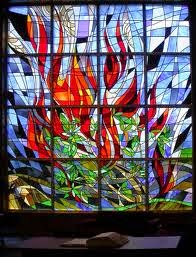The Twelfth Sunday after Pentecost, Proper 17, 31 August 2014

The Twelfth Sunday after Pentecost, Proper 17, 31 August 2014 Exodus 3:1-15 Psalm 105:1-6, 23-26, 45c Or Jeremiah 15:15-21 Psalm 26:1-8 Romans 12:9-21 St. Matthew 16:21-28 Background: The Symbolism of the Burning Bush It is interesting that the root word SNH (bush or bramble) is similar to SNi (Sinai), so that some commentators see it as mistaken substitution for Sinai. The actual text is a weaving of the J document and the E document, but the story has influenced Muslims, Christians, and Jews throughout the centuries. The Eastern Church see the story as evidence of God’s “uncreated energies”, just as Moses witnessed God’s glory in Exodus 33:18ff . The Orthodox also see in the burning yet not destroyed bush a symbol of the virginity of the Blessed Virgin Mary. Certain churches of the reformation used the symbol of the burning bush, and its destruction/survival as a symbol of their own survival during the turmoil amongst t...
